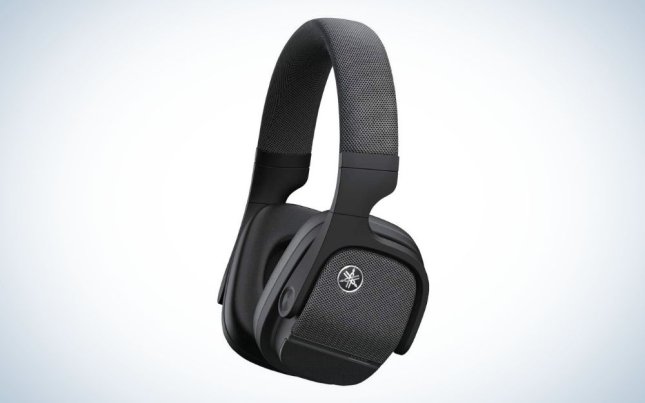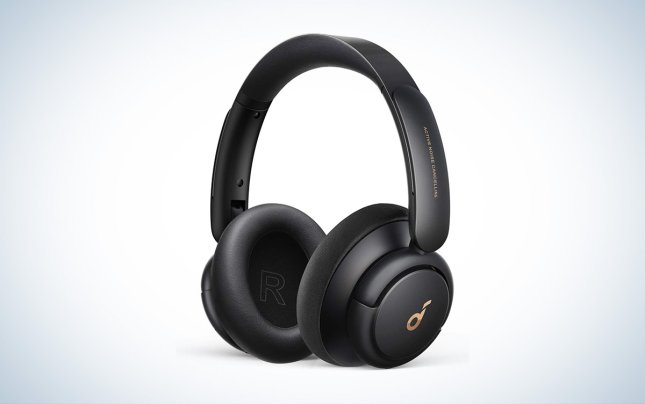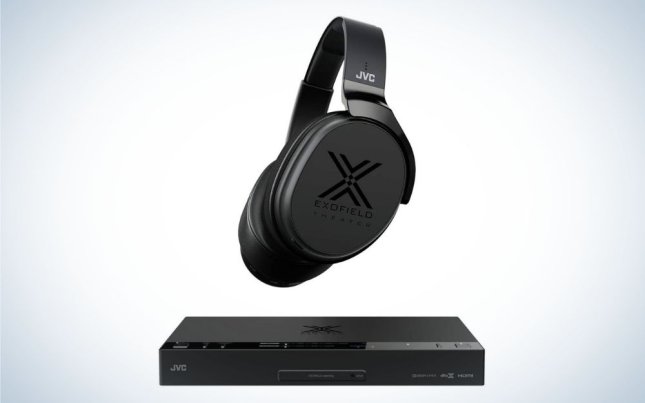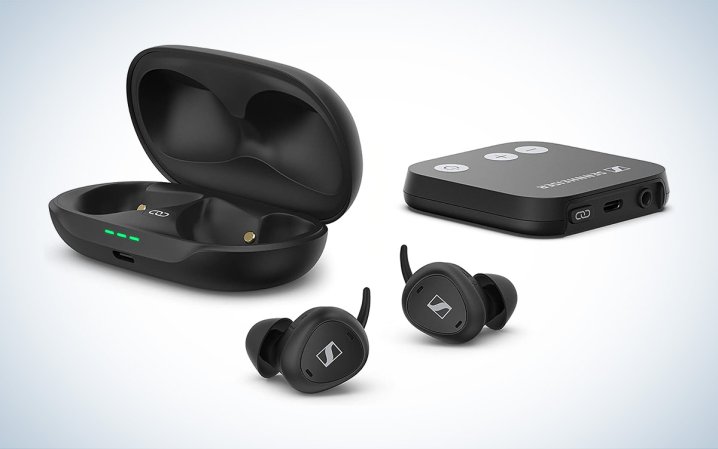We may earn revenue from the products available on this page and participate in affiliate programs. Learn more ›
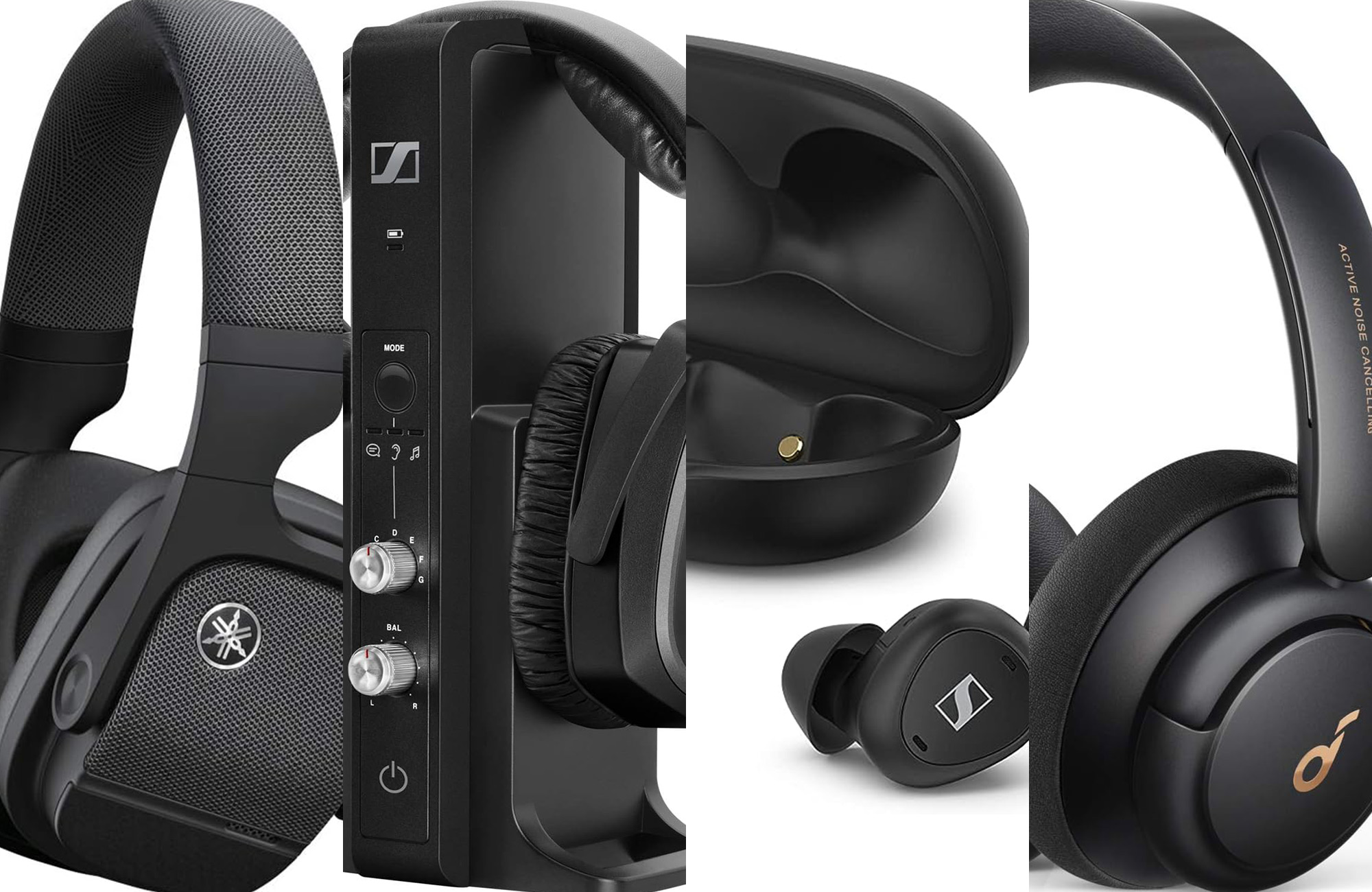
When it comes to gadgets for home theaters, picture quality gets most of the press, but even the best TVs don’t have good built-in audio, which is where wireless headphones for TV come in. Sound matters, so we’re going to talk about some sound matters. Once you experience a truly great soundscape with your favorite films, shows, or games, you’ll never want to go back. Multi-speaker systems replicate the theater experience best but can be harder to set up in smaller spaces and get very expensive very quickly. Plus, the ground-shaking T. rex steps that get your heart racing might also get your neighbors racing to file a noise complaint. So what’s the answer when space, wallet, or society conspire to deny you the sonic stimulation you so richly deserve? The best wireless headphones for TV, that’s what.
- Best overall: Yamaha YH-L700A
- Best with transmitter: Sennheiser RS 195 RF
- Best gaming: Astro A50 Wireless Gen 4
- Best cinephile: JVC Exofield Personal Home Theater System
- Best earbuds: Sennheiser TV Clear Set 2
- Best budget: Anker Life Soundcore Q30
How we chose the best wireless headphones for TV
First of all, naturally, we removed all wired headsets from contention. Generally, wired headphones offer better sound than wireless, but that gap is not nearly as wide as it once was. We considered Bluetooth headsets and those that use their own base stations/wireless protocols. Options up and down the budget spectrum were assessed, though none of these headsets hit $1,000, and most are under $500. The list below is an amalgamation of first-hand reviews, recommendations by trusted colleagues, and the consensus of the audio-video press. These were then delineated into categories that can guide you toward cans that can.
The best wireless headphones for TV: Reviews & Recommendations
It’s unlikely you’ll be disappointed with any of the wireless headphones we’ve selected. Even the budget set is quite nice. And it’s certainly a huge upgrade if you’re only listening to the built-in sound of your TV’s speakers (no matter how amazing that new OLED display is, we promise the sound is lacking). The most important thing to note is the exclusive features of each headset, as the general sound and use of all these units are strong. Regardless of which wireless headphones for TV you choose, your ears will thank you for your service to their joy.
Best overall: Yamaha YH-L700A
Best overall
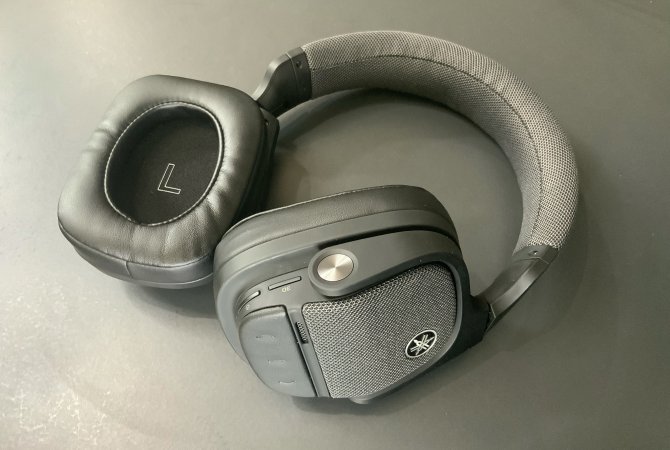
Pros
- Clear, crisp sound
- Versatile 3D Sound Field mode sweetens stereo sound signals significantly
- Bluetooth and wired options allow use in the maximum number of set-ups
- Excellent noise-canceling
Cons
- Cinema audio settings aren’t as true-tuned as units rated for Dolby Atmos
- Cups can get quite warm around the ears
- Head-tracking feature doesn’t improve sound experience much
Why it made the cut: With features on features, the Yamaha YH-L700A pairs excellent quality sound with modes of listening that make it excellent for TV, gaming, music, and work.
Specs
- Format: Over-ear headphones
- Noise cancellation: Active noise canceling
- Connection: Bluetooth
- Battery life: 34 hours
Yamaha is an old-school name in audio, but the company’s top-tier headphone is packed with the newest technology. What caused this set to edge out our others is its jack-of-all-trades mentality. That pairs with great sound and low latency from its high-quality Bluetooth 5.0 connection (featuring the advanced resolution aptX Adaptive codec for compatible Android devices, plus AAC for iPhones). Additionally, The YH-L700A’s seven selectable Sound Fields can transform any input into an approximation of 3D sound, improving any broadcast or stream even if higher-quality audio options aren’t available.
The noise-canceling on this pair is quite adept, featuring a range of dynamic filtering modes that are easy to implement. In addition to active noise cancellation, which analyzes and counteracts environmental sound, Listening Optimizer adjusts equalization on the fly based on the noises around you, boosting levels when the environment would normally pierce through. This is great for rambunctious kids or city noises if you’re an urban dweller. Listening Care ensures that important sonic cues aren’t lost at lower volume levels by re-juggling the equalization to pop what needs to pop. It also differentiates between primary sound and background noise. The Yamaha YH-L700A ends up offering one of the most impressive low-volume listening experiences available.
The headset itself is comfortable, though the ear cups can make quite a warm seal. Its battery life is robust, reaching 34 hours at less taxing use. The Bluetooth connection does reduce what these earphones can achieve. But the use of aptX Adaptive, a next-gen codec for wireless audio, ensures the best quality sound with the lowest latency possible over the Bluetooth protocol. And Bluetooth does open up a ton of possible uses other than with your TV. You’ll also be able to use these while walking or exercising, in public transit, or at computer workstations.
Don’t forget that for the highest-quality sound settings, like those with Blu-ray or the best streams, you’ll need to use the wired connection option on these bad boys. Bluetooth simply doesn’t have the bandwidth necessary to give you those richest soundscapes. The nice thing about this set, though, is that even in lower-quality settings, like pure stereo, the 3D modes really add some space and area to the sound in your head, giving a “2.5D” experience. Taking below-average sound and making it sing—that’s the makings of a best-in-class. If you want to know even more about our favorite set, check out the in-depth review.
Best with transmitter: Sennheiser RS 195 RF
Best with transmitter
Senning is Winning
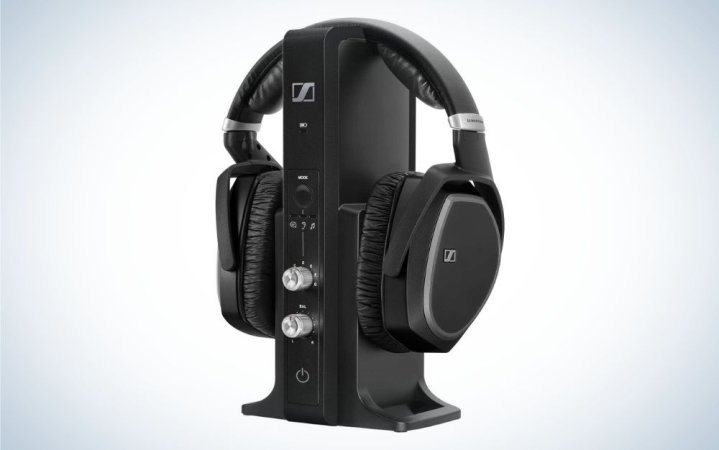
Pros
- Incredible clear sound
- Customizable
- Able to sweeten dialog or music
- Nearly no audio lag thanks to RF technology
- Long battery life with charging dock
Cons
- No Bluetooth compatibility / device-bound
- Somewhat bulky construction
- Not cheap
Why it made the cut: Sennheiser is a name synonymous with quality headphones, and these are no exception, thanks to their clarity, comfort, and consistent signal via a dedicated transmitter.
Specs
- Format: Over-ear headphones
- Noise cancellation: None
- Connection: Transmitter
- Battery life: 18 hours
Sennheiser can be trusted. Some may quibble over what the very best headphones on the market are. But Sennheiser’s name is always in the conversation. And it will come as little surprise that a company that makes what we consider the best all-in-one soundbar on the market understands how to pair audio with video. So when it comes to headphones built to work with television, the venerable German brand also sets a gold standard.
You won’t get Dolby Atmos, unlike in the company’s soundbars, but the sound quality is really strong, focusing on clarity rather than volume. Sennheiser often markets these particular headphones to customers with hearing issues because of their ability to isolate certain elements of sound. That includes clearer dialog, which helps listeners who otherwise would need to jack the volume up to hear the characters speaking. The benefit for users who don’t have hearing issues is that you can fully customize the sound levels of not just volume, bass, and treble, but the sweetening of certain elements and save those settings as a selectable preset.
However, while these are wireless headphones for TV, they’re not portable. The transmitter/dock that connects to the audio source isn’t meant to be taken on the go. And there’s no Bluetooth compatibility. The wireless is instead RF (a radio signal) created by the transmitter/dock. While that limits the devices that it can be used with, it means there’s almost no latency (lag) between the source signal and the sound in your head. Every spoken word and dramatic sound will sync up with the screen. Additionally, there is up to 330 feet of range, even though this set is designed to live with your audio source. Those who want precise, impressive sound inside comfortable, noise-dampening headphones can rest assured that Sennheiser stands above the rest.
An important thing to note about the Sennheiser RS195 RF is that it’s not always easy to get. While there is new-in-box product out there, including on Amazon, the high quality and desirability of these now-discontinued headphones mean that there are times when their secondary-market price can be higher than their original MSRP. Despite this, they are still recommended due to their incredible performance. Just keep that price in mind. If you want a cheaper alternative, the step-down model, the Sennheiser RS 175 RF, is also sometimes available on Amazon, again with a potentially inflated cost.
Best gaming: Astro A50 Wireless Gen 4
Best gaming
For the Love of the Game
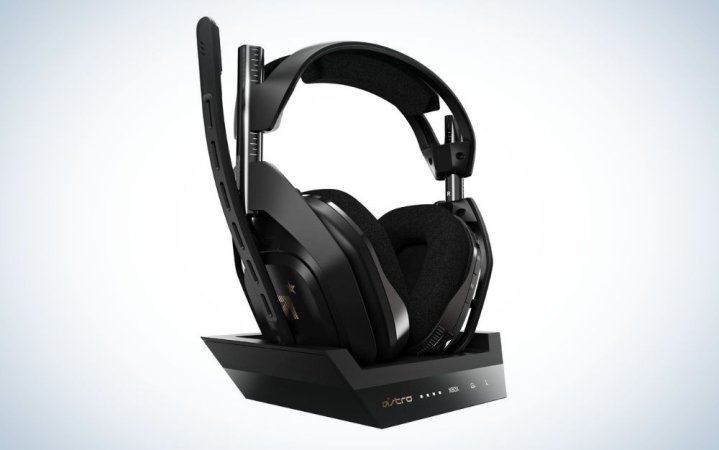
Pros
- Nearly no lag on wireless sound
- Supports lower-end surround sound modes (5.1)
- Included mic is strong quality, for communication while gaming
- Dolby Atmos support with Xbox version
Cons
- No universal version
- Battery life could be longer
- Command Center software has some issues on Windows 11 (though this will probably get fixed)
Why it made the cut: Game soundscapes have come a long way from 8-bit beeps and boops, and so have headsets like this specifically calibrated one that gives you 3D sound and maybe even a competitive advantage.
Specs
- Format: Over-ear headphones
- Noise cancellation: None
- Connection: Transmitter
- Battery life: 15 hours
Gamers know the power of great headsets. Competitive games test your eyes, your hand reflexes, and even your ears. The higher the quality of your sound, the more easily you can pinpoint the location of the enemy from his gunfire sounds. Then you can dominate him easily, and isn’t that what it’s all about? And you don’t have to spend hundreds (though you easily can if you snag Master & Dynamic MG20 or Audeze Penrose X).
The Astro A50 comes in two models. Both offer compatibility with PC and Mac, but you need separate versions for the next-gen. Xbox and PlayStation families. The Xbox version offers an advantage over the PlayStation with Dolby Atmos 3D sound support. That feature requires you to sign up for a subscription, but there’s a voucher included that gives you a free trial. Both Astro A50 headsets give you great clarity and placement and communicate quickly with the base station. That results in nearly no lag, a key for gaming.
The mic is a flip-down boom-type that auto-mutes when flipped up. You don’t have to stare at it if you’re using these headphones to listen to some streaming media through your console instead of playing a game. In a competitive gaming headset space, there are better wired options out there. But you won’t find better wireless options than the Astro A50.
Best cinephile: JVC Exofield Personal Home Theater System
Best cinephile
Cranial Cinema Sound

Pros
- Theater sound in headphones
- DTS:X and Dolby Atmos compatible
- Amazing range and dynamic sound
- Offers sound that is simply not attainable on other headphones
- App, once it works, offers amazing customization and calibration
Cons
- Most expensive item on our list
- Difficult to set up and optimize
- Difficult to connect components in a way that maximizes all of them
Why it made the cut: Truly focused, the JVC Exofield Personal Home Theater System is not just a set of headphones but also a sonic processor, meaning you get the truest cinema-spec sound beamed straight to your head.
Specs
- Format: Over-ear headphones with set-top processor
- Noise cancellation: None
- Connectivity: Transmitter
- Battery life: 12 hours
The JVC Exofield Personal Home Theater System is designed to do only one thing, and it does that thing very well: producing a theater-style multichannel soundfield within headphones. The vast majority of the wireless headphones for TV on our list cannot process true object-based sound. Instead, they offer extremely high-quality stereo sound that, while lovely to listen to, is not going to have the depth or location that the Exofield offers. Using a 2.4GHz/5GHz dual-band Wi-Fi connection to transfer full-fidelity cinema sound between the set-top unit and headphones, the Exofield system brings realism and surrealism in the way it delivers a spacious, immersive experience through its 40mm drivers. The main drawback of this incredible piece of technology, other than it requiring space on or in your credenza, is that it is finicky to set up and to communicate with other devices.
Set up is a bit arduous, involving taking measurements. And it can potentially error out, forcing you to restart the process. The choice of marrying many of the options to an app could backfire in the future if an update breaks the software or the app gets delisted, and you need to download it to a new device. Setting up the transmitter correctly—patching through the right inputs/outputs (don’t forget those HDMI cables) to ensure all your components work correctly on your screen—can be a difficult task. Though, usually, a unit like this assumes the end-user doesn’t need much handholding when it comes to A/V. It’s just important to consider how plug-and-play things truly are when buying a nearly $1,000 audio system.
The sound is amazing and near-flawless when optimized, offering a surreal experience of over a half-dozen points of sound inside headphones. But getting there may be a battle. It is a battle that’s absolutely worth it if you’re a cinephile. The bass kicks, the dialog sparkles, and you’ll hear elements within your movie soundscapes that were literally inaudible on TV speakers.
Best earbuds: Sennheiser TV Clear Set 2
Best earbuds
Sennheiser TV Clear Set 2
Pros
- Qi wireless charging compatible
- Great for people with glasses
- Speech clarity mode choices are unmatched
- Provides access to an app with customization options
Cons
- Expensive
Why it made the cut: Lose the headband but keep the same high-quality Sennheiser sound with these TV-ready earbuds.
Specs
- Format: In-ear headphones
- Noise cancellation: Passive noise cancellation
- Connectivity: Bluetooth or TV transmitter connection
- Battery life: 15 hours
Those with glasses—or those who hate the feeling of wearing headphones—can find over-ear headphones difficult to comfortably wear. The TV Clear set from Sennheiser solves that problem by packing high-quality sound into lightweight earbuds. And they are so lightweight that they are practically unnoticeable while you sport them. You can choose from five different speech clarity settings for clearer dialogue. It’s like turning up the brightness on a Game of Thrones episode but with sound.
True wireless earbuds, TV Clear 2 can connect with tablets, laptops, or smartphones and can be used to make and receive calls. But what sets these ‘buds apart is you can use the included pre-paired transmitter with your TV to set your own preferred earbud volume while family and/or guests watch at the sound level of their choice.
You can use an app to personalize your TV-watching experience with five listening profiles with speech clarity levels of up to 20 dB of high-frequency amplification. In addition, the app can help you find the earbuds if they fall into a couch, etc. And the transmitter’s low latency keeps audio and video in sync. The Ambient Awareness mode allows you to hear your surroundings while you watch, if you want, so you can hear if the popcorn’s done or your kid is trying to sneak back into the house.
And you can pair as many Bluetooth headphones to the connector as you like. The 15-hour battery life (with an additional 22 added by the case) means you can get through a quarter of a Love Island season without taking a pause. No headband, no problem.
Best budget: Anker Life Soundcore Q30
Best budget
Sound Hard Core
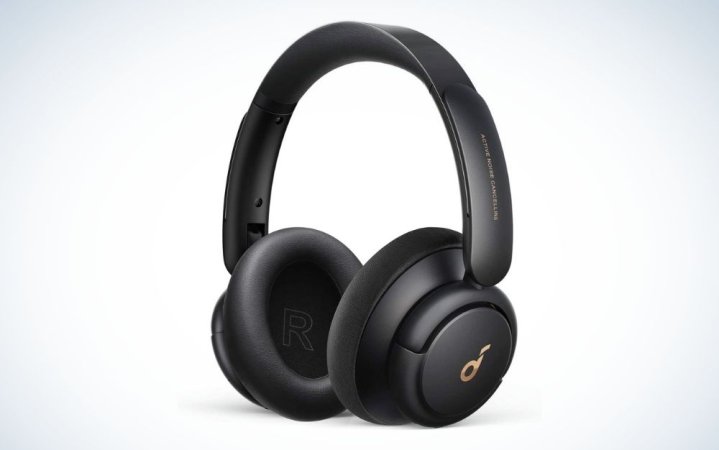
Pros
- Low price
- Excellent battery life
- Features some noise-canceling via pre-sets
- Anker is known for good customer support
Cons
- Sound is budget-level
- Needs app for best calibration
- Ear cups are very small
Why it made the cut: While its sound can’t compare with its competitors, the Anker Soundcore Q30’s price blows them all away, making these headphones a great backup set or quick replacement.
Specs
- Format: Over-ear headphones
- Noise cancellation: Active noise cancellation
- Connectivity: Bluetooth
- Battery life: 40 hours battery life
Sometimes, the dollar is almighty. If you’re looking to get serviceable wireless headphones for TV under $100, the answer is the same as it often is in the budget tech space: Anker. Anker is known for low-price products that don’t feel low-price, coupled with helpful and hassle-free customer support. The Anker Life Soundcore Q30—a slightly older model than the current Q35 that saves you $50—is exactly what you expect from the company. It’s a solid, if unspectacular, headset that includes a few surprising features. But mostly, most importantly, it understands the assignment.
The surprising feature here is a form of noise-canceling. While it isn’t groundbreaking, there are three presets that can determine how ambient sound is filtered. Fiddling through these can definitely improve your listening experience, making these the best cheap noise-canceling headphones we can recommend. Additional customization and equalization (EQ) are available by pairing the headphones with a phone or tablet and using an app. For TV, these headphones aren’t going to blow you away. They don’t support multichannel audio, so you’ll only be able to listen in stereo. But if $100 is your budgetary ceiling, the Anker Life Soundcore Q30 is a serviceable, portable option to listen to your TV’s audio solely between your own ears.
What to consider before buying the best wireless headphones for TV
If it were 10-20 years ago, it would have been silly to suggest headphones could give you an immersive sound experience with your TV. But now, technology has blessed us with a world of personal listening devices that are tech’d, tuned, and tested to bring the best out of Blu-ray, streaming devices, a gaming console, etc. Plus, isn’t versatility important? Nobody wants to be tethered to a device without the ability to walk to the kitchen to pop another bag of corn in the microwave while simultaneously staying in your program’s audioverse.
Why do you want wireless headphones for TV?
Before even considering wireless headphones for TV, you’ll want to think about your reasons for choosing them over other sound options. If you live alone in a home that shares no walls with other people, the pull of wireless headphones is more for their versatility outside of using them with your TV. In that case, you’ll likely want to get a pair that uses Bluetooth for its connection. It will allow you to pair the headphones with a phone or computer as well as with your TV. If this aspect of the headphones doesn’t appeal to you, you can achieve better sound with a multi-speaker system with wireless surround sound. Or you can get comparable audio with a high-quality soundbar, like one with Dolby Atmos capabilities.
However, if privacy for yourself or consideration for a coinhabitant or neighbor are chief considerations for your sound set-up, headphones are the best choice. Even headphones that are not considered “noise-canceling” will isolate your ears and allow you to experience blow-me-away booms without bothering anyone but those in close proximity. As for what is lost in the transition from multi-speaker/soundbar to headphones, the good news is that it isn’t much. The richness of the sound may falter a bit compared to a more powerful system. But multi-channel, deep soundscapes can be replicated within headphones quite adeptly, using multiple small speakers within the headphone earcup.
How do you use your TV?
The last thing to consider is what your most common TV uses are. If you’re into 4K content, cinema-quality sound spec compatibility is really key for a good pair of headphones. DTS (formerly Digital Theater Systems) has DTS:X—a sound setting that allows greater “location” within the soundscape. For example, let’s say a character in a movie on one side of the screen shoots a bullet toward a character on the other. DTS:X-compatible headphones receiving a DTS:X signal will do a much better job of placing the sound of the gun going off, moving the bullet sound across the headphones, and producing the impact in the correct place on the other side.
Dolby Atmos, a competing sound spec, does essentially the same thing. It treats sounds as “objects” assigned a spot within a 360-degree sphere around the listener. Headphones that create these sorts of soundscapes will seem much more immersive than simple 5- or 7-channel speaker systems. Meanwhile, if you’re a gamer, very specific placement of sounds is useful for competitive 3D games. It gives you a better clue of where to move your avatar to mow down your enemies. Additionally, a quality microphone for communicating with online teammates, as well as good blending and delineation between game audio and voice channels, helps the gaming experience.
Can wireless headphones for TV replace a multi-speaker sound system?
Replace is a tough word to use. The truth is, if your living situation allows a high-end multi-speaker home theater system and you can afford one, that is what is going to produce the very best, most impressive sound experience. However, not everyone has the ideal circumstances that allow this. While they won’t stand up to the top of the line, a quality pair of headphones designed for TV viewing will be better than a mediocre multi-speaker system.
More importantly, you can use and enjoy a pair of headphones in literally any case. They’ll work in a small apartment, a busy family home, or by yourself in your gigantic mansion. The sound quality will be high and enveloping. Some people, especially those with hearing issues, may find headphones easier to calibrate for comfortable bass, treble, and volume levels without losing ambient or background sound. Headphones are not a replacement; they’re an alternate experience and one that may be better for your particular needs.
What else can I do with my wireless headphones?
Some of these wireless headphones use their wireless signals through a unit plugged into your wired inputs on your TV. Headphones that use their system rather than the more universal Bluetooth tend to have much lower latency. Latency is the delay between a signal being sent and received. When listening to music, latency can be annoying. It can make moving through tracks seem sluggish, for example. But it doesn’t really ruin the listening experience the way audio that doesn’t sync with a TV can. However, these plug-in receivers are not going to be as portable or adaptable to different listening situations as a Bluetooth unit will be.
With a Bluetooth headset, you can pair it with your phone or laptop and take it with you on the go. For the plug-in receiver sets, you’ll likely end up using the headphones almost exclusively with your TV. However, a good pair of headphones is going to be useful for movies, streaming, and gaming. While some features relevant to the specific use may not be available in all units, everything we reviewed performs “above average” in all of these categories, which will be the three most common signals coming out of your TV.
FAQs
Our picks, much like all wireless headphones, range widely—from $100 to $500. In this day and age, you can pair almost any Bluetooth headphone with a new connected smart TV. So you might be able to find a pair from $50 to $999. However, headphones (and earbuds) made for TV are preferable. They feature hardware and software optimization to make sure audio and video stay in sync, which is why we have highlighted them in this guide.
Bluetooth, as a technology, is great because it’s versatile, and tons of devices have it. Overall, the best sound is not going to come from Bluetooth headphones. Instead, it will come from headphones that use their own plug-in units to connect their wireless signals. However, that doesn’t mean that Bluetooth isn’t good. A quality Bluetooth headset can absolutely blow you away with the level of quality it’s capable of. But that’s great engineering compensating for the specific issues with Bluetooth rather than the innate quality of Bluetooth itself.
Typically, you’ll either plug in a small unit to your TV (or receiver) that sends the wireless signal to your headphones over a dedicated protocol, or you’ll connect with Bluetooth. The former is capable of faster, bolder signals and, thus, higher-quality sound. But the latter can still impress in a good set.
If roommates, family, or apartment neighbors are a concern when watching TV, you’ll want to prioritize noise-canceling headphones. Not only do these types of headphones seal out noise from the world when you are listening to your music, but they also stop noise from your headphones from bleeding out beyond your ears.
If your TV is not innately Bluetooth compatible, you can buy a Bluetooth transmitter that plugs into the aux input on your TV. There are several that are solid, but we recommend the Aisidra 5.0, which can work both as a transmitter and receiver, not only turning your “dumb” TV into one that is Bluetooth compatible but also turning your wired headphones into Bluetooth-capable wireless headphones.
Most of the sets we sell have an option to use a wired connection in lieu of wireless, so there’s also that option. As for the non-Bluetooth headphones, they’ll come with a small box or dongle that connects to the TV or audio receiver that will send all the audio to your headphones. It’s a relatively simple setup, and the included instructions will walk you through the steps.
To confirm if your TV has built-in Bluetooth, check the box (if you still have it) for a Bluetooth symbol or look up your TV model online. “MODELNUMBER Bluetooth” should be a good enough Google search to get you the answers you need.
Modern TVs all produce sound digitally, so most wireless headphones are simply going to convert that digital information into a wireless signal that will be picked up by your headphones. This will either be done by a standard built-in Bluetooth transmitter or through a proprietary plug-in unit that establishes a dedicated connection.
See above! We can recommend any of the sets in this article, and “best” may end up being a matter of budget and your particular use profile.
Final thoughts on the best wireless headphones for TV
- Best overall: Yamaha YH-L700A
- Best with transmitter: Sennheiser RS 195 RF
- Best gaming: Astro A50 Wireless Gen 4
- Best cinephile: JVC Exofield Personal Home Theater System
- Best earbuds: Sennheiser TV Clear Set 2
- Best budget: Anker Life Soundcore Q30
There are a lot of choices to make once you’ve made the choice to get a set of the best wireless headphones for TV. Remember to adjust your headphones out of the box, both by changing the headphones’ settings and your TV or receiver’s settings to find the sweet spot for your ears. Everyone can be different, and the “default” settings—whether it be the picture on a screen or the sound emanating from it—are not always the ideal. Happy listening.
